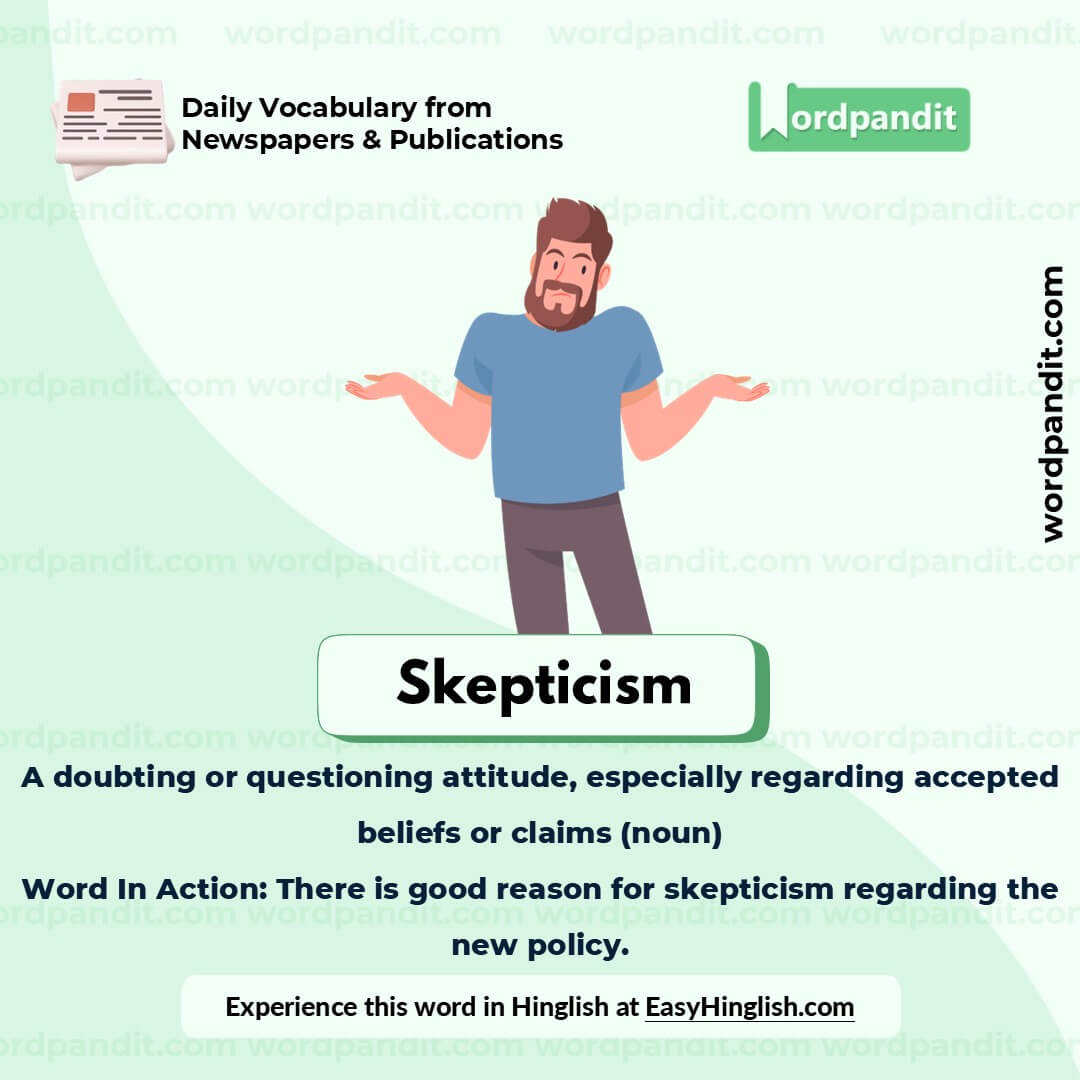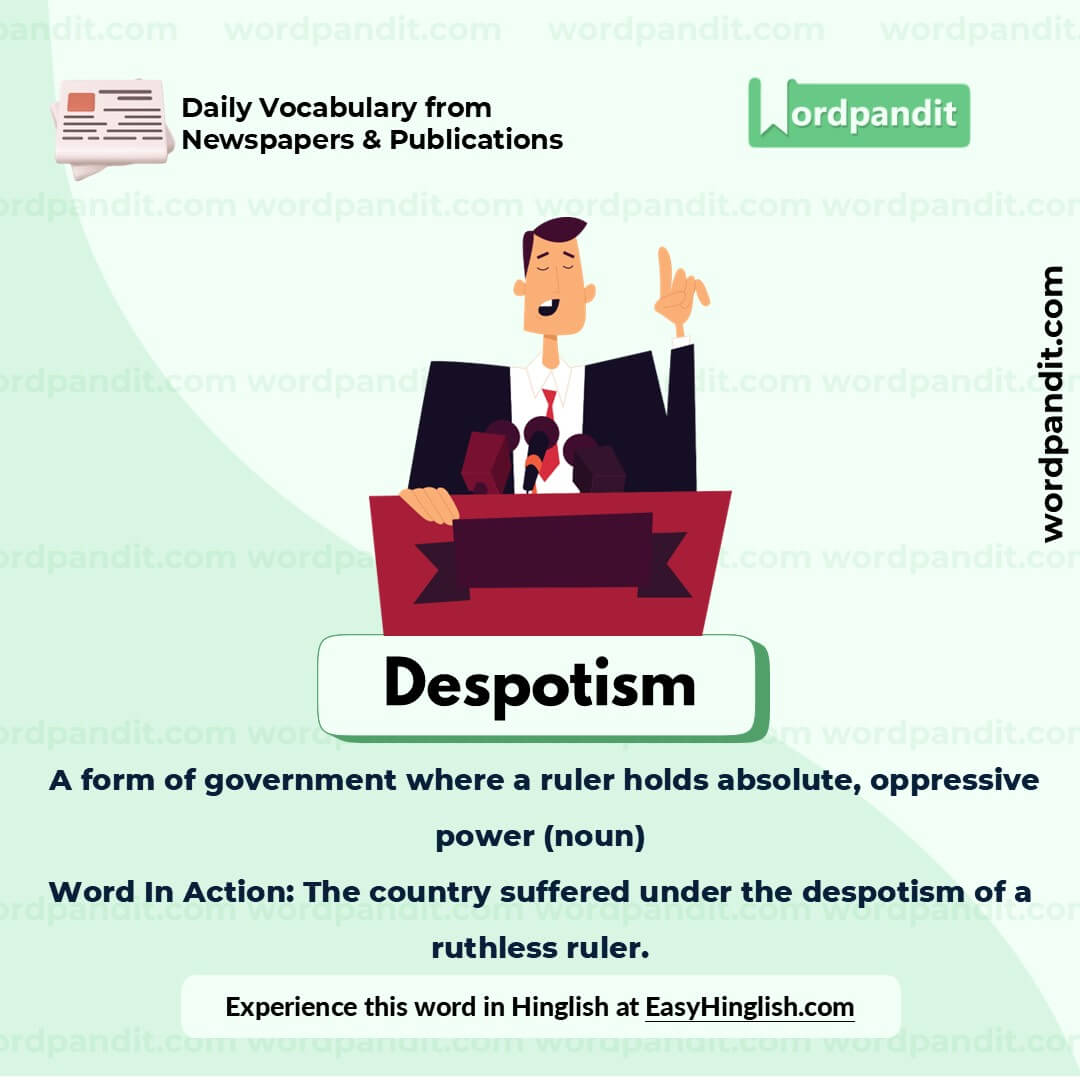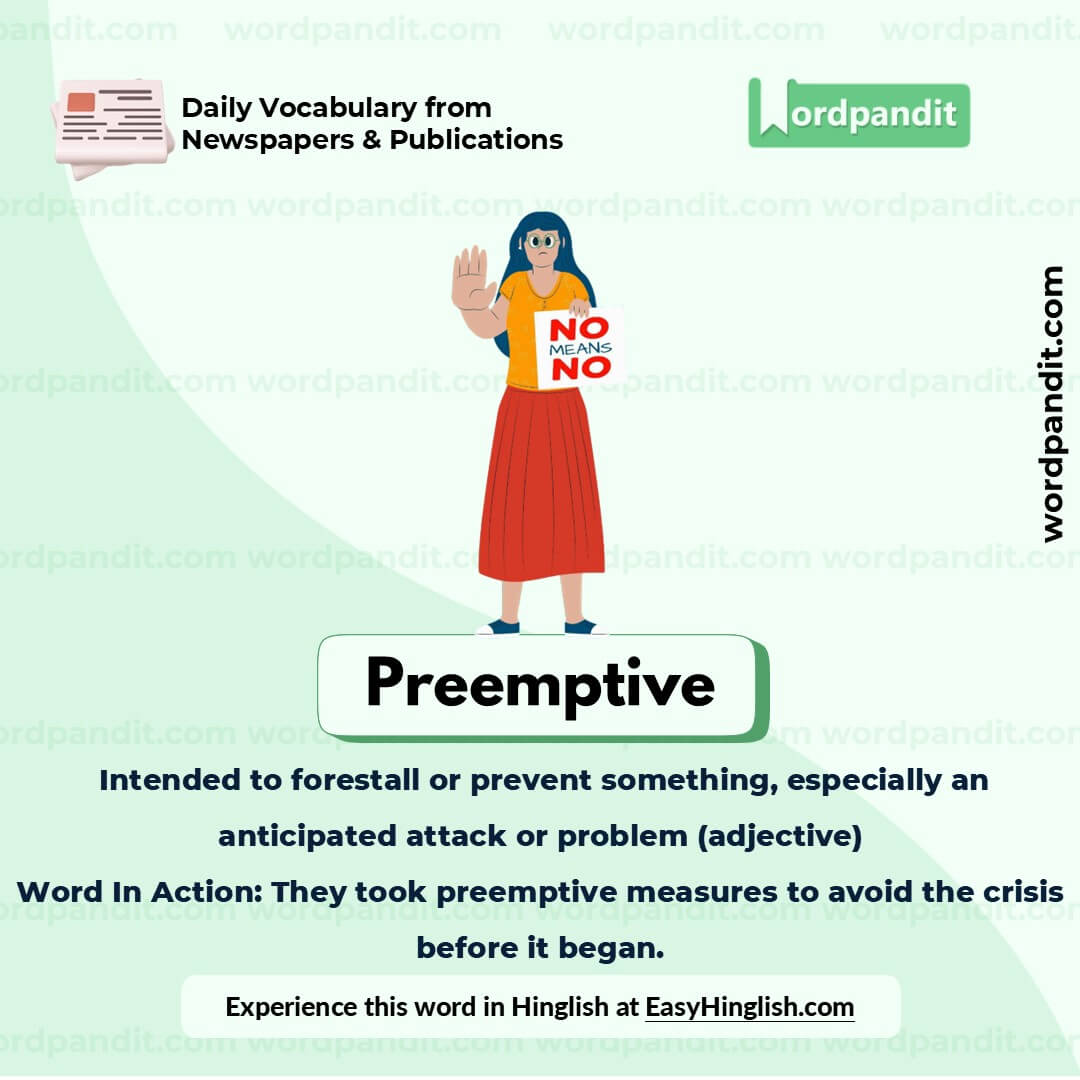Daily Vocabulary from International Newspapers and Publications
Expand Your Vocabulary with Wordpandit’s Global Vocabulary Hub
At Wordpandit, we are committed to helping you develop a truly global vocabulary by drawing from some of the most respected international publications. This section is designed to keep you ahead of the curve by introducing you to words that define global conversations and trends.
The Power of Global Sources
To help you think and communicate on a global scale, we curate vocabulary from renowned international sources, such as:
- The New York Times
- The Washington Post
- BBC
- The Guardian
- The Economist
- Scientific American
- Psychology Today
- And many more...
Stay Global, Stay Competitive
Our daily updates from international publications ensure you are consistently exposed to new words that reflect global news and developments, making sure your vocabulary is not only current but also globally relevant.
Enhance Your Global Perspective
Whether you’re preparing for international exams, aiming to excel in global business communication, or want to enhance your language skills for personal growth, Wordpandit offers the resources you need to thrive in a global context.
Effective Learning, Global Reach
Our learning methodology combines global examples, memory aids, and interactive activities, allowing you to internalize new words effectively and apply them in real-world scenarios.
Begin Your Global Vocabulary Journey Now!
Why Choose Wordpandit?
Practical Learning: Focus on words you'll actually encounter in real-world reading, enhancing your comprehension and communication skills.
Diverse Content: From current affairs to scientific breakthroughs, our varied sources expose you to vocabulary across multiple domains.
Effortless Integration: Make Wordpandit a part of your daily routine. Just a few minutes each day can significantly boost your lexicon over time.
Your Path to Vocabulary Mastery
- Visit our Daily Vocabulary section regularly
- Explore new words and their usage in context
- Practice incorporating these words into your own writing and speech
- Track your progress as your vocabulary expands
Start Your Journey Today
Embark on your vocabulary enhancement journey with Wordpandit. By consistently engaging with our daily posts, you'll build a robust vocabulary that serves you well in academic, professional, and personal contexts.
Remember, a word a day keeps linguistic limitations at bay. Make Wordpandit your daily companion in the quest for vocabulary excellence!
WORD-1: Skepticism
Context:
"There is good reason for skepticism." - The Washington Post
Explanatory Paragraph:
Skepticism refers to a doubting or questioning attitude, especially when it comes to accepting claims, statements, or beliefs without sufficient evidence. When someone approaches something with skepticism, they are hesitant to accept it as true until they have more proof or information.
Meaning: A doubting or questioning attitude, especially regarding accepted beliefs or claims (noun)
Pronunciation: SKEP-ti-siz-uhm
Difficulty Level: ⭐⭐⭐ (Intermediate)
Etymology: From Greek skeptikos, meaning "inquiring" or "reflective."
Synonyms & Antonyms:
Synonyms: doubt, suspicion, disbelief, mistrust
Antonyms: trust, belief, confidence, certainty
Usage Examples:
- The public reacted with skepticism to the politician's promises of reform.
- Her skepticism about the new scientific study led her to conduct further research.
- There is growing skepticism over the company's claims of sustainability.
- The teacher encouraged healthy skepticism among students, asking them to question assumptions.
Cultural Reference:
"Extraordinary claims require extraordinary evidence." - Carl Sagan, a statement often used to encourage skepticism in science and critical thinking.
Think About It:
Why is skepticism an important mindset in both science and everyday life? When can too much skepticism become a problem?
Quick Activity:
Write about a time when you felt skeptical about something. What was the situation, and what made you question it?
Memory Tip:
Think of "skepticism" as a "skeptic's system" of questioning, where you're always analyzing the evidence before accepting something as true.
Real-World Application:
Skepticism is crucial in fields like science, journalism, and law, where critical thinking and questioning are necessary to avoid false assumptions and uncover the truth.
WORD-2: Demagoguery
Context:
"It remains uncertain whether demagoguery will carry the day." - The Washington Post
Explanatory Paragraph:
Demagoguery refers to the practice of appealing to people's emotions, prejudices, and fears rather than using rational arguments, often for political gain. It's when a leader manipulates a crowd by exploiting their feelings, usually to advance their own power.
Meaning: Manipulating emotions for political gain (noun)
Pronunciation: dem-uh-GAW-guh-ree
Difficulty Level: ⭐⭐⭐ (Intermediate)
Etymology: From Greek dēmagōgia meaning "leader of the people"
Synonyms & Antonyms:
Synonyms: rabble-rousing, agitator, manipulative rhetoric, populism
Antonyms: reasoned debate, logical discourse, statesmanship
Usage Examples:
- The candidate's speech was full of demagoguery, playing on the crowd’s fears without offering real solutions.
- History has shown that demagoguery can sometimes lead to dangerous outcomes when unchecked.
- The politician's demagoguery distracted from the actual issues, focusing instead on inflaming emotions.
- Critics accused the leader of demagoguery for stirring up anger rather than presenting clear policies.
Cultural Reference:
"The demagogue is one who preaches doctrines he knows to be untrue to men he knows to be idiots." - H.L. Mencken
Think About It:
Why do you think demagoguery is often effective, even when the arguments are irrational?
Quick Activity:
Identify a recent political speech and determine if any part of it could be considered demagoguery. What emotions were being appealed to?
Memory Tip:
To remember "demagoguery," think of "demo" (people) and "gog" (guide or leader), and imagine a leader misguiding people emotionally.
Real-World Application:
Understanding demagoguery is crucial in politics and media literacy, helping you recognize when someone is using emotional manipulation instead of sound arguments.
WORD-3: Despotism
Context:
"Where despotism can be taken pure, and without the base alloy of hypocrisy." - The Washington Post
Explanatory Paragraph:
Despotism refers to a system of government where a single ruler holds absolute power, often using it in a tyrannical or oppressive manner. In a despotic regime, the ruler has unchecked authority and governs without considering the needs or rights of the people, usually relying on force and fear to maintain control.
Meaning: A form of government where a ruler holds absolute, oppressive power (noun)
Pronunciation: DES-puh-tiz-uhm
Difficulty Level: ⭐⭐⭐⭐ (Advanced)
Etymology: From French despotisme, based on the Greek word despotes, meaning "master" or "lord."
Synonyms & Antonyms:
Synonyms: tyranny, autocracy, dictatorship, oppression
Antonyms: democracy, freedom, liberty, egalitarianism
Usage Examples:
- The country suffered under decades of despotism, with no room for political dissent.
- His rule was marked by despotism, as he silenced opposition and centralized all power.
- The revolution was fueled by a desire to overthrow despotism and restore freedom.
- The people lived in fear, unable to speak out against the government's despotism.
Cultural Reference:
"Power tends to corrupt, and absolute power corrupts absolutely." - Lord Acton, a famous commentary on the dangers of despotism and unchecked authority.
Think About It:
What are the key differences between despotism and other forms of authoritarian rule? How can societies prevent the rise of despotic leaders?
Quick Activity:
Research a historical example of despotism. Write a short summary of how the ruler maintained absolute control and the impact it had on the society.
Memory Tip:
Think of "despotism" as "despotic power," where a single ruler "despots" (acts like a despot) over everyone without regard for fairness or justice.
Real-World Application:
The term "despotism" is often used to describe extreme forms of dictatorship and oppression where individuals or regimes exercise complete control without accountability.
WORD-4: Preemptive
Context:
"Describes Israel’s strikes against Hezbollah as a preemptive measure to avoid future attacks." - The Washington Post
Explanatory Paragraph:
Preemptive refers to an action taken in anticipation of a future threat, with the aim of preventing that threat from occurring. In a preemptive strike or measure, one acts first to counter a potential problem before it fully develops, often in military or strategic contexts.
Meaning: Intended to forestall or prevent something, especially an anticipated attack or problem (adjective)
Pronunciation: pree-EMP-tiv
Difficulty Level: ⭐⭐⭐ (Intermediate)
Etymology: From Latin prae- (before) + emere (to take), meaning "to take before."
Synonyms & Antonyms:
Synonyms: preventive, anticipatory, precautionary, proactive
Antonyms: reactive, responsive, retaliatory, delayed
Usage Examples:
- The government launched a preemptive strike to neutralize the growing threat from the rebel forces.
- He took a preemptive step by addressing the issue before it escalated into a major problem.
- In a preemptive move, the company acquired patents to protect itself from competitors.
- The coach made a preemptive substitution to avoid injury to the star player during the game.
Cultural Reference:
"It is better to be proactive than reactive." - Stephen Covey, emphasizing the importance of taking preemptive actions to avoid problems before they arise.
Think About It:
How do you determine when a preemptive action is justified, and when it might be seen as unnecessary or even harmful?
Quick Activity:
Write a brief scenario where a preemptive action is taken in a non-military context, such as in business or personal life. How did the action help or hinder the situation?
Memory Tip:
Think of "preemptive" as "pre-empting" or "acting before" something happens, which helps you recall its meaning of preventing future issues.
Real-World Application:
The word "preemptive" is frequently used in political, military, and business contexts to describe actions taken to prevent a foreseeable issue, such as preemptive strikes, legal defenses, or precautionary measures.
WORD-5: Comeuppance
Context:
"Hezbollah is said to receive its comeuppance for its history of violent acts." - The Washington Post
Explanatory Paragraph:
Comeuppance refers to a punishment or retribution that someone rightfully deserves, often after engaging in wrongdoing or unjust behavior. It's the idea that people eventually get what they deserve, particularly when their bad actions catch up with them.
Meaning: A deserved punishment or fate, especially one that is seen as just (noun)
Pronunciation: kuh-MUHP-uhns
Difficulty Level: ⭐⭐⭐ (Intermediate)
Etymology: From the phrase "come up" in the sense of presenting oneself for judgment, combined with the suffix "-ance."
Synonyms & Antonyms:
Synonyms: retribution, reckoning, punishment, justice
Antonyms: forgiveness, pardon, leniency, acquittal
Usage Examples:
- After years of cheating investors, the corrupt CEO finally got his comeuppance in court.
- The villain in the movie received his comeuppance in the end, much to the audience's satisfaction.
- Despite years of evading the law, he knew his comeuppance was inevitable.
- She faced her comeuppance when her lies were exposed, losing the trust of everyone around her.
Cultural Reference:
"In the end, we will all face our comeuppance, if not in this life, then in the next." - A common sentiment reflecting the belief in moral justice, often seen in literature and storytelling.
Think About It:
Why do people find satisfaction in seeing someone receive their comeuppance? Is it a reflection of our desire for justice or revenge?
Quick Activity:
Write a short story about a character who receives their comeuppance. What did they do, and how did their actions catch up with them?
Memory Tip:
Think of "comeuppance" as something that "comes up" to someone who deserves it — like their past wrongs catching up with them.
Real-World Application:
The term "comeuppance" is often used in both legal and informal contexts to describe a situation where someone faces the consequences of their actions, especially in cases of long-standing wrongdoing.


















